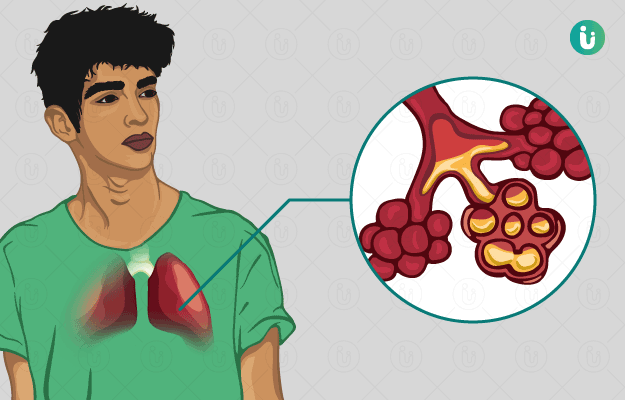What is cystic fibrosis?
Cystic fibrosis is a genetic disease that progressively affects various organs, especially the lungs by the accumulation of mucus. It is also seen to manifest in the digestive tract and reproductive tract. It is a life-threatening condition affecting approximately 70,000 people globally. Among the racial groups, it is widely seen in the Caucasians. Cystic fibrosis prevalence is 1 in 10,000 births in India.
What are its main signs and symptoms?
Most of the symptoms of cystic fibrosis occur in infancy as children suffer from more respiratory illnesses with declining lung function each year. Affected individuals may develop symptoms from childhood or they may develop symptoms later in their life, which can vary in severity. Cystic fibrosis can be detected in newborns in the first month of life, even before the onset of symptoms.
Frequent respiratory symptoms include:
- Severe cough (dry or with mucus)
- Wheezing
- Recurrent sinus infection
- Allergies
Digestive tract symptoms include:
- Unpleasant large, greasy bowel movements
- Unusual weight loss despite adequate diet
- Retarded growth
- Bowel irregularity
- Frequent sensation of thirst and urination (Read more: Frequent urination causes)
Troubled by obesity? Failed to lose weight? Now control weight easily by myUpchar Ayurveda Medarodha Weight Control Tablet. Get started today and take steps towards a healthy life.
What are its main causes?
Cystic fibrosis affects the normal bodily secretions such as mucus, sweat, and digestive juices. The mucus becomes thicker and is lodged in the lungs causing difficulty while breathing. This is due to a genetic defect, affecting a protein (cystic fibrosis transmembrane conductance regulator [CFTR]) that influences the movement of salt in and out of body cells. The defective genes are transferred to the baby if both parents are carriers of the gene. If only one of the parents has the gene, then the child will not develop symptoms of cystic fibrosis, but can become a carrier and may pass it onto the next generation.
Risk factors include:
- Genetic factor:
- The gene mutations are classified according to the degree of damage to the CFTR protein.
- In gene mutations, Class I, II, and III are more severe, while class IV and V are milder.
- Lifestyle and environmental factors:
- More calories are needed to maintain weight, which may be burdensome.
- Smoking can worsen lung function.
- Alcohol can lead to liver issues.
- Age factor:
- Symptoms worsen with age.
How is it diagnosed and treated?
New-born screening and diagnosis are available these days to detect cystic fibrosis at the earliest.
The following tests may be performed:
- Blood test: To check the levels of immunoreactive trypsinogen or IRT from the pancreas.
- Genetic tests: These are performed to confirm the disease.
- Sweat test: To check the level of salt in the sweat (in infants).
For older kids and adults, both genetic and sweat test may be recommended for recurring pancreatitis, nasal polyps, and chronic infection of the lungs.
Treatment options for cystic fibrosis include:
- Medications:
- Mucus-thinning drugs.
- Enzymes and nutritional supplements.
- Antibiotics.
- Anti-inflammatory drugs.
- Physiotherapy:
- To assist in boosting airway clearance and improving sinus management, exercising and supplemental medicines may be needed.
- Lung transplants.
- If medications prove ineffective, lung transplant would be the treatment of choice.
Cystic fibrosis, due to its inherited nature, cannot be completely cured. Therefore, early diagnosis and treatment is the best option to treat it and to avoid further fatal complications.

 Doctors for Cystic Fibrosis
Doctors for Cystic Fibrosis  OTC Medicines for Cystic Fibrosis
OTC Medicines for Cystic Fibrosis



















